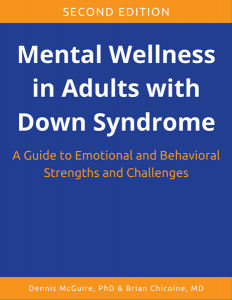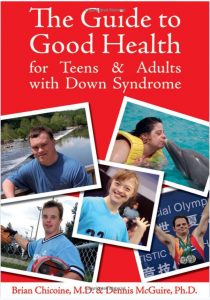New guidelines for medical care of adults with Down syndrome have been published in the US recently.
The recommendations are based on a thorough review of all available research, and are an extremely useful resource. They provide evidence based clinical guidelines to support high quality care for adults with Down syndrome throughout their life.
You can read the full resource, including the Global Medical Care Guidelines Checklist.
The guidelines are lengthy, and the checklist is targeted at medical professionals, but it will be useful for people with Down syndrome and their families to be aware of the recommendations.
Update – July 2022
A new family-friendly version of the adult health guidelines has been published by the Adult Down Syndrome Center and is free to download, this useful resource is an evidence-based recommendation to support family members in their care of adults with Down syndrome.
The recommendations and statements of good practice cover the following 10 areas:
- Diagnosis and Treatment of Behavioral Health Conditions.(Recommendations 1 & 2 and statements of good practice 1 & 2)
- Diagnosis of Dementia. (Recommendations 3 & 4)
- Screening for Diabetes. (Recommendations 5 & 6)
- Prevention of Cardiovascular Disease. (Recommendation 7)
- Stroke Prevention. (Recommendations 8 & 9)
- Obesity Screening and Management (Recommendation 10 and statement of good practice 3)
- Screening for Atlantoaxial Instability. (Recommendation 11)
- Screening for Osteoporosis. (Recommendations 12 & 13)
- Screening for Thyroid Disease. (Recommendation 14)
- Screening for Coeliac Disease. (statement of good practice 4)
These recommendations and statements of good practice are given in full at the end of this article.
As always, if you are concerned about health issues or changes in behaviour you should consult your family doctor.
This summary and discussion is part of DSI’s work to ensure that research is accessible to families. Medical professionals should follow the link above to read the original document.
There is a lack of research in many areas, so some recommendations are based on relatively few research studies. A statement of good practice was made when there was a high level of certainty that the recommendation would do more good than harm, but there was little direct evidence.
Discussion:
A change in how people behave, how well they manage everyday tasks and how they relate to others can be the first sign that something is wrong, particularly in people who don’t communicate well verbally. Any decline in someone’s ability to manage aspects of their life is a cause for concern, and can have many different reasons. Reviewing possible physical, sensory and environmental causes of any change in mood or behaviour is important.
Caution is needed when diagnosing age-related Alzheimer’s dementia in people with Down syndrome under 40. It does happen, but is much more likely in people who are in their 40s or older. There are several other medical conditions associated with Down syndrome which can lead to a decline in skills. Some of these are more likely than dementia in people under 40, and are often treatable.
If you have concerns, your GP, as always, is your first port of call. Your GP can rule out some of the other medical conditions and can refer on for further investigations, including referral to a memory clinic if needed. There are several Memory Clinics located around the country.
A healthy diet and regular exercise are important for us all, but they are crucial for adults with Down syndrome. Weight management is likely to reduce the risks of some other conditions (such as diabetes and sleep apnoea) and enhance quality of life.
Vision and hearing are not mentioned in the recommendations, but people with Down syndrome of all ages will benefit from regular vision and hearing checks. There are some visual conditions such as keratoconus which are more common in people with Down syndrome and are only treatable if caught early. Research in many areas is limited and while these recommendations are an excellent starting point, there is still a need for additional research.
Down Syndrome Ireland highly recommend the books ‘Mental Wellness in Adults with Down Syndrome’ and ‘The Guide to Good Health for Teens and Adults with Down Syndrome’ written by Dr. Brian Chiccoine MD and Dr. Dennis McGuire Ph.D., who have worked with people with Down syndrome for many years and were part of the group who formulated the new guidelines.
MD and Dr. Dennis McGuire Ph.D., who have worked with people with Down syndrome for many years and were part of the group who formulated the new guidelines.
These books are very readable, and they provide information and suggestions which may be helpful, along with many real life examples. Anyone who has attended one of Dr McGuire’s conferences in Ireland will know that his focus on practical interpretation of behaviour change and real-life solutions is extremely helpful.
Recommendations and statements of good practice:
Diagnosis and Treatment of Behavioral Health Conditions.
Recommendation 1
When concern for a mental health disorder in adults with Down syndrome is present, medical professionals should refer the patient to a clinician knowledgeable about the medical, mental health disorders, and common behavioral characteristics of adults with Down syndrome.
Recommendation 2
When concern for a mental health disorder in adults with Down syndrome is present, medical professionals should follow guidelines for diagnosis in the DSM-5 in conjunction with the DM-ID-2. (This is aimed at professionals, rather than families, and refers to clinical criteria for diagnosing mental health conditions)
Statements of Good Practice 1 and 2
A review of behavioral, functional, adaptive, and psychosocial factors should be performed as part of an annual history that clinicians obtain from all adults with Down syndrome, their families, and caregivers (SOGP 1).
When concern for a mental health disorder in adults with Down syndrome is present, medical professionals should evaluate patients for medical conditions that may present with psychiatric and behavioral symptoms (SOGP 2).
Diagnosis of Dementia
Recommendation 3
Caution is needed when diagnosing age-related, Alzheimer-type dementia in adults with Down syndrome younger than 40 years because of its low prevalence before this age.
Recommendation 4
Medical professionals should assess adults with Down syndrome and interview primary caregivers about changes from baseline function annually, beginning at age 40 years. Decline in 6 domains specified by the National Task Group–Early Detection Screen for Dementia (NTG-EDSD) should be used to identify early-stage age-related Alzheimer-type dementia, a potentially reversible medical condition, or both. These include: memory and executive function, behavior and personality, language and communication, gait and motor skills, activities of daily living, continence, and sleep patterns.
Because clinicians may attribute symptoms of Down syndrome to Alzheimer-type dementia without adequately considering alternative causes, a weak recommendation suggests that clinicians should exercise caution when attributing symptoms to Alzheimer-type dementia in adults with Down syndrome younger than 40 years. Benefits of considering other causes, including treatable conditions (eg, hypothyroidism, sleep apnea), significantly outweighed potential harms (underdiagnosis of true Alzheimer-type dementia).
Screening for Diabetes
Recommendation 5
For asymptomatic adults with Down syndrome, screening for type 2 diabetes using glycated hemoglobin or fasting plasma glucose levels should be performed every 3 years beginning at age 30 years.
Recommendation 6
For any adult with Down syndrome and comorbid obesity, screening for type 2 diabetes using glycated hemoglobin or fasting plasma glucose level should be performed every 2 to 3 years beginning at age 21 years.
Cardiovascular Disease Prevention
Recommendation 7
For adults with Down syndrome without a history of atherosclerotic cardiovascular disease (ASCVD), the appropriateness of statin therapy should be assessed every 5 years starting at age 40 years and using a 10-year risk calculator as recommended by the USPSTF for adults without Down syndrome.
Stroke Prevention
Recommendation 8
For adults with Down syndrome, risk factors for stroke should be managed as specified by the American Heart Association/American Stroke Association’s (AHA/ASA) Guidelines for the Primary Prevention of Stroke.
Recommendation 9
In adults with Down syndrome with a history of congenital heart disease, given the elevated risk of cardioembolic stroke, a periodic cardiac evaluation and a corresponding monitoring plan should be reviewed by a cardiologist.
Obesity Screening and Management
Recommendation 10
Monitoring for weight change and obesity should be performed annually by calculating BMI in adults with Down syndrome. The USPSTF recommendation for behavioral weight loss interventions to prevent obesity-related morbidity and mortality in adults should be followed.
Statement of Good Practice 3
A healthy diet, regular exercise, and calorie management should be followed by all adults with Down syndrome as part of a comprehensive approach to weight management, appetite control, and enhancement of quality of life (SOGP 3).
Screening for Atlantoaxial Instability
Recommendation 11
In adults with Down syndrome, routine cervical spine radiographs should not be used to screen for risk of spinal cord injury (SCI) in asymptomatic individuals. Instead, annual screening of adults with Down syndrome should include a review of signs and symptoms of cervical myelopathy, such as altered gait, new incontinence, brisk reflexes, or clonus, using targeted history and physical examination.
Screening for Osteoporosis
Recommendation 12
For primary prevention of osteoporotic fractures in adults with Down syndrome, there is insufficient evidence to recommend for or against applying established osteoporosis screening guidelines, including fracture risk estimation; thus, good clinical practice would support a shared decision-making approach.
Recommendation 13
All adults with Down syndrome who sustain a fragility fracture should be evaluated for secondary causes of osteoporosis, including screening for hyperthyroidism, celiac disease, vitamin D deficiency, hyperparathyroidism, and medications associated with adverse effects on bone health.
Screening for Thyroid Disease
Recommendation 14
Screening adults with Down syndrome for hypothyroidism should be performed every 1 to 2 years using a serum thyrotropin test beginning at age 21 years.
Screening for Coeliac Disease
Statement of Good Practice 4
Adults with Down syndrome should receive an annual assessment for gastrointestinal and nongastrointestinal signs and symptoms of celiac disease using targeted history, physical examination, and clinical judgment of good practice (SOGP 4).
Please visit the Global Down Syndrome website for further information on the evidence and the rationale for each of these recommendations:



